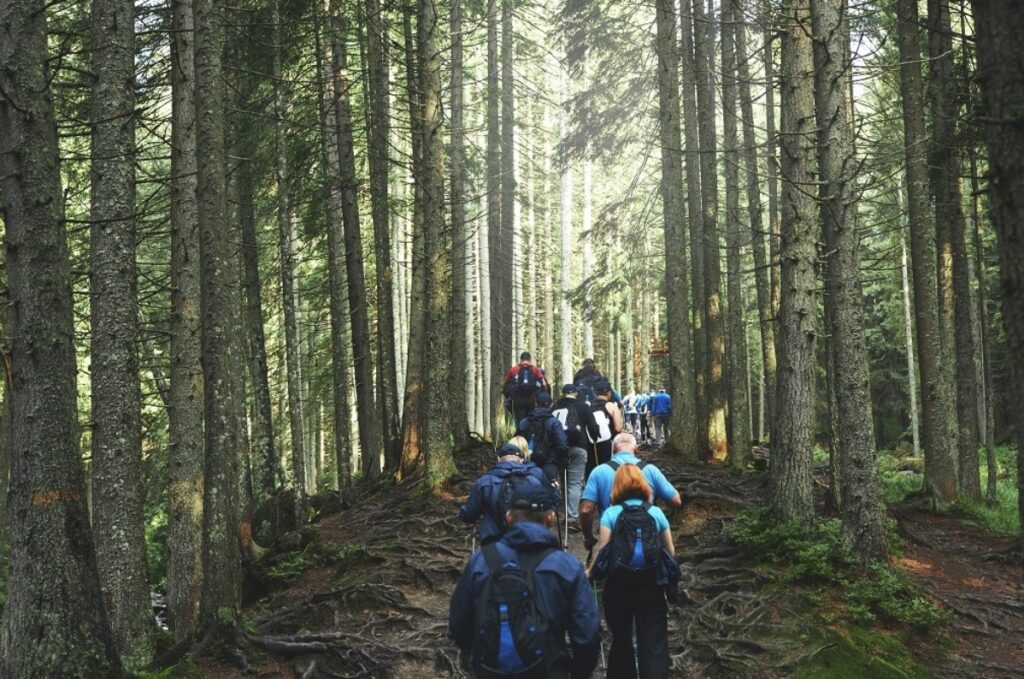Register your interest here for The ForestLink’s Executive Forum. A first of its kind platform for bringing together the top leadership of forest companies in the tropics
APPLY NOW

Companies benefit when their leaders have a strong network of peers. If you look to the jurisdictions of a well-established forest industry you will find several long-standing successful businesses. Of course, these geographies have the advantage of several decades of forest management science, technology, and market sophistication – yet I believe a large part of this success stems from leadership and connectedness. The sector’s leaders are well connected through various channels, and benefit from the availability of several industry events and associations to share knowledge. In the tropics, forest company leaders tend to be more restricted to the network and learnings provided within the operational borders of their business, and sometimes through their investors’ immediate network.
The Forum for Forest Executives is designed to break down these borders. Giving leaders both access to a peer network, collective knowledge exchange, and leadership upskilling. This latest article dives into the benefits of network, with a foreword from the Forum’s executive coach, Rita Jupe.
Foreword by Forum Executive Coach, Rita Jupe
Networking. The word has baggage. It can conjure memories of exchanges of contacts that went nowhere, and feelings of unease. And with all the demands that work places on us, no matter how much we enjoy what we do, networking can understandably end up in the ‘not urgent and not important’ area of our time management planning. What if we were to look at networking in another way?
This latest blog from The ForestLink makes the case for taking a “network perspective,” which in a nutshell recognizes that networking can contribute to organizational effectiveness, business results and sector-wide transformation.
In my coaching work, especially with emerging leaders, no matter the sector, networking often comes up as something that clients know is important for their business or organization, but they consider it to be a bit awkward and a bit self-serving. Clients also say they want to be sure that any networking they do is meaningful (the time crunch). And as the blog notes, working in tropical remote locations of the forest industry adds more hurdles.
Let’s first tackle the perception that networking can be self-serving, which can leave some of us feeling awkward. I encourage my clients to think about networking as nothing more than two people in any given situation exchanging value and building a relationship across time. This definition comes from organizational psychology, you might also say it’s common sense because reciprocity is a feature of many cultures. In practical terms, exchanging value can run from sending an article we think someone in our internal network might find useful as a way to stay connected a few times a year, to meeting up with peers for quarterly discussions about industry trends. Networking, as you will know, isn’t confined to receptions, conferences and the (hybrid) workplace.
Then there’s the matter of time. I encourage my clients to be intentional, starting with their organization’s goals and identifying:
- Who are the decision-makers (internally and externally),
- Who needs to be informed, and
- Whose knowledge, influence or resources are necessary to make progress.
By doing this work up front, ideally with others in their network, any additional networking that follows will have a better chance of being an efficient and effective use of time.
In a sector such as forestry in the tropics where executives can be quite isolated geographically, peer groups that emerge from an initial time commitment of a few days of focused discussions on trends, opportunities and challenges can add value both to the executives’ respective line responsibilities and to industry imperatives such as sustainability. This is what The ForestLink aims to bring about.
If we shift from thinking of networking as an “add-on” to taking a network perspective, we can integrate networking into our project planning efficiently – and with good results. Let’s leave the “baggage” and pick up networking approaches that fit our needs.
Fostering the Network Perspective in Forestry
Us Foresters and those who devote their work to forests have an often-overlooked trait – we enjoy the natural environment and tend to be less interested in complex social engagements. Yes, I’m generalizing – but my point here is best explained by an analogy. Have you ever gone to the gym and your trainer explains that what you need is not actually what you enjoy the most? For example – you’re a highly competitive runner and like to train at high intensity, but your trainer identifies that what your body needs to balance this is some slow pace stretching. You finally devote some time to this and realize that not only do you feel better – your running performance improves.
What I mean to say here is, forest company leaders whose focus is naturally on optimizing sustainable forest management, wood production and sales could improve their business’ and personal performance through developing their network.
In the article, Network Perspective and Leadership, by Center for Creative Leadership (CCL), the network concept is explored:
“Network perspective is the ability to look beyond formal, designated relationships and see the complex web of connections between people in and beyond your organization”.
Among wider concepts, the network perspective means knowing who has influence and where to go for information and that leadership considers both natural and strategically created networks. The article highlights 7 reasons to take a network perspective.
7 Reasons to Take a Network Perspective
- Connections Matter
- Work often happens through informal channels,
- Leadership occurs through relationships,
- Successful leaders develop networks of strong, diverse relationships,
- Network knowledge is an asset in change efforts,
- Innovation networks can be identified and supported,
- The most important challenges leaders face today are interdependent.
Relating these reasons to the case of executives of forest companies in the tropics, several opportunities emerge. Here, I’d like to draw your attention to the fourth reason listed: Successful leaders develop networks of strong, diverse relationships and what this has to do with performance.
What would a strong and diverse network look like for forest company leaders in the tropics?
Forest company leaders may differ in geography, business size, markets, investor support, and capacity of local talent, but they share a very common central objective – creating thriving forest businesses in nascent markets. Strength comes from the opportunity to connect and build trust. It requires open dialogue and an openness to integrate the ideas of others. Ultimately, building a thriving forest industry in the tropics is a collective effort. It is not made by one success story, but several – and through taking a network perspective across forest companies, this is achievable. Performance can be improved for the leader, the company, and the industry.
The Forum for Forest Executives exists to facilitate collective learning. It provides a network for executives to share knowledge and a platform to uplift leadership skills beyond critical experiential learning.
Applications now open
Applications for the Forum for Forest Executives are now open. If you apply before February 23rd, you will benefit from the early bird window that includes the following:
- Priority for acceptance to the May Forum (space is limited, and the group will be curated),
- Help shape the content of the leadership training,
- Access a reduced price (the price will increase after 23rd February).
We look forward to welcoming you to the Forum for Forest Executives.
Connect with your peers. Foster leadership expertise. Build a thriving forest business.





